|
|
|
Sort Order |
|
|
|
Items / Page
|
|
|
|
|
|
|
| Srl | Item |
| 1 |
ID:
087826
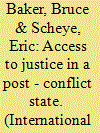

|
|
|
|
|
| Publication |
2009.
|
| Summary/Abstract |
Post-conflict governments and donors prioritize rebuilding the justice sector through state delivered rule of law and access to justice programmes. Misunderstanding the nature of the post-colonial state, such programmes make questionable assumptions. First, that a lack of access to state justice is the same as an overall absence of justice. Second, that the state system that is being built is what people want. Third, that the state system of justice that is being built could provide a sustainable nationwide network in the foreseeable future. Based on interviews conducted with policy designers, practitioners, local people and chiefs at three sites in southern Sudan 2007, this article calls for a rethinking of donor-supported justice and police development and advocates an approach that recognizes the importance of local justice.
|
|
|
|
|
|
|
|
|
|
|
|
|
|
|
|
| 2 |
ID:
100304
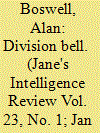

|
|
|
| 3 |
ID:
105087
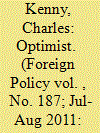

|
|
|
|
|
| Publication |
2011.
|
| Summary/Abstract |
The myth of the smug teetotaler is no joke. Many of the most popular theories of economic growth in wealthy countries, dating back to the Protestant work ethic of Max Weber, emphasize the abstemious and sober virtues of the well-to-do. And from the 18th-century Gin Acts in Britain to Prohibition in 1920s America to a certain class of modern-day economists, there's a long tradition of blaming intemperance for the persistence of poverty.
|
|
|
|
|
|
|
|
|
|
|
|
|
|
|
|
| 4 |
ID:
108266
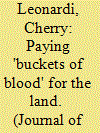

|
|
|
|
|
| Publication |
2011.
|
| Summary/Abstract |
This paper challenges the prevailing focus on ethnic division and conflict in Southern Sudan in recent years, demonstrating that even within ethnically divisive debates over land, there are shared, transethnic levels of moral concern. These concerns centre on the commodification and monetisation of rural and kinship resources, including human life itself, epitomised in ideas of land being bought with blood, or blood being turned into money by the recent wartime economy. It argues that the enduring popular ambivalence towards money derives not only from its commonly observed individualising properties, but also from the historical association of money with government. Southern Sudanese perceive historical continuity in government consumption and corruption, and express concern at the expansion of its alternative value system into rural economies during and since the war. Whilst seeking to access money and government, they nevertheless continue to employ a discursive but powerful dichotomy between the moral worlds of state and kinship.
|
|
|
|
|
|
|
|
|
|
|
|
|
|
|
|
| 5 |
ID:
174160
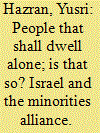

|
|
|
|
|
| Summary/Abstract |
The state of Israel, and the Zionist movement before it, has always considered itself to be facing an existential threat from hostile surroundings. Hence, seeking alliance with non-Arab nations and ethnic minority groups in the area was seen as a means of confronting this challenge. During the early decades of its existence, the Israeli establishment adopted the concept of the alliance of the periphery and the alliance of minorities developed by Israel’s first prime minister, David Ben-Gurion and his protégée, Reuven Shiloah, the founder of the Israeli intelligence service, the Mossad. This research project will demonstrate that, in opposition to apologetic and ideologically-motivated arguments that deny that alliance with minority communities has been a systematic policy, the minorities’ alliance has for decades been an important foundation of Israeli strategy vis-à-vis the Arab world. Furthermore, the article will argue and demonstrate that the ‘Minorities Alliance’ is derived from ideological, historical, and strategic considerations anchored in the very existence of Zionism and Israel. Furthermore, and on the same note, this conception and strategy cannot be disconnected from the self-perception of Zionism, its self-directed reading of Jewish history, and the Zionisation of the milieu.
|
|
|
|
|
|
|
|
|
|
|
|
|
|
|
|
| 6 |
ID:
165692


|
|
|
|
|
| Summary/Abstract |
A remarkable feature of the Southern Sudanese liberation movement during the First Sudanese Civil War was its use of anti-colonial discourse and tactics. Soon into their struggle, the Southern Sudanese came to depict their situation as colonisation by the Muslim-Arab elite in Khartoum. As this article argues, this adoption of anti-colonial identity was the outcome of Southern Sudanese interaction with neighbouring Arab and African first-generation liberation movements, through which the future leaders of the Southern Sudanese liberation movement observed and absorbed the practices used against European colonialism. When the Southern Sudanese launched their liberation struggle, these practices shaped their struggle.
|
|
|
|
|
|
|
|
|
|
|
|
|
|
|
|
| 7 |
ID:
027624
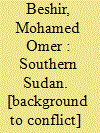

|
|
|
|
|
| Publication |
London, C Hurst and Co., 1968.
|
| Description |
xiii, 192p.hbk
|
|
|
|
|
|
|
|
|
|
|
|
Copies: C:1/I:0,R:0,Q:0
Circulation
| Accession# | Call# | Current Location | Status | Policy | Location |
| 001015 | 962.404/BES 001015 | Main | On Shelf | General | |
|
|
|
|
| 8 |
ID:
109033
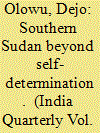

|
|
|
|
|
| Publication |
2011.
|
| Summary/Abstract |
After decades of sanguineous struggle for political and economic self-determination, the peoples of South Sudan eventually voted en masse for the emergence of the newest African state: the Republic of Southern Sudan. Beyond the euphoria of national liberation, however, this article traces similar experi-ences in the assertion of self-determination and how their dynamics could relate to post-liberation Southern Sudan. It is argued that beneath the broadly unifying theme of 'national' resistance to northern oppression lies more complex and ongoing struggles over the ownership and control of core historical narratives, identities, symbols and resources. Despite the pervasive ambience of fear, scepticism and caution in which Southern Sudan will ultimately emerge as a full-fledged sovereign state in July 2011, this article highlights certain variables that could turn out to be the lessons for and from this embryonic state. While not failing to point to the inherent frailties of this new state, this article strongly canvasses the collaboration of internal and external forces in turning Southern Sudan's challenges and opportunities into veritable vehicles for making this entity a successful African story in post-independence nation-building and development as well as a unique contribution to self-determination discourses in an atmos-phere of sustainable peace and prosperity.
|
|
|
|
|
|
|
|
|
|
|
|
|
|
|
|
|
|
|
|
|